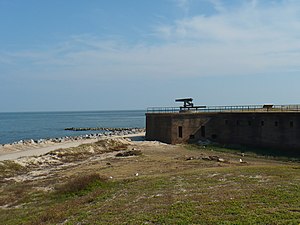| This article needs additional citations for verification. Please help improve this article by adding citations to reliable sources. Unsourced material may be challenged and removed. Find sources: "Siege of Fort Gaines" – news · newspapers · books · scholar · JSTOR (December 2009) (Learn how and when to remove this message) |
| Siege of Fort Gaines | |||||||
|---|---|---|---|---|---|---|---|
| Part of the American Civil War | |||||||
 Fort Gaines on Dauphin Island | |||||||
| |||||||
| Belligerents | |||||||
| United States (Union) | Confederate States | ||||||
| Commanders and leaders | |||||||
| Gordon Granger | Charles D. Anderson | ||||||
| Strength | |||||||
| 1,500 | 818 | ||||||
| Casualties and losses | |||||||
| Unknown killed and wounded |
3 KIA 50 WIA 765 surrendered | ||||||
| Operations in Mobile Bay | |
|---|---|
The siege of Fort Gaines, Alabama, occurred between August 3 and 8, 1864, during the American Civil War. It took place in the Mobile Bay area of Alabama as part of the larger battle of Mobile Bay, and resulted in the surrender of the fort and its defenders.
Siege
Union forces under the command of Major Genereral Gordon Granger landed on Dauphin Island, about 7 miles from Fort Gaines, on August 3, and moved against Fort Gaines guarding the western edge of Mobile Bay. Granger's force numbered about 1,500, while 818 troops under the command of Confederate Colonel Charles D. Anderson garrisoned the fort. Brigadier General Richard L. Page instructed Anderson not to surrender the fort. The fort was supposed to be able to withstand a six-month siege. However, on August 5 the Union fleet ran past Forts Gaines and Morgan, and defeated the Confederate fleet in the bay. The Union fleet had 199 guns to attack with, while the Confederates only held 26 within the walls of Fort Gaines. Anderson, believing he could not hold out against a combined attack by the Union army and navy, chose to surrender the fort on August 8.
Aftermath
With the fall of Fort Gaines, Granger left a garrison at the fort and immediately moved against Fort Morgan to the east. After a two-week siege of Fort Morgan, Page surrendered his fort on August 23. The loss of these two forts gave control of Mobile Bay and ended the bay's use as a port for the Confederates.
References
- ^ Eileen, Mattei (2016). "A Tale of Two Forts on Mobile Bay: FORT GAINES AND FORT MORGAN". Army History. 20 (2): 36–43.
- A Tale of Two Forts on Mobile Bay
- Rodgers, Thomas G. (1998). "Last Stand at Fort Blakely". America's Civil War. 11 (5): 48.
- Howard, Charles Malone (1986). "A Letter from Fort Gaines" (PDF). Gulf Coast Historical Review. 2 (1): 71–78. PMID 11617023. Retrieved April 7, 2018.
30°14′54″N 88°04′37″W / 30.24824°N 88.076870°W / 30.24824; -88.076870
| Alabama in the American Civil War | |
|---|---|
| 1861 | |
| 1863 | |
| 1864 | |
| 1865 | |
| Units | |
| Places | |
This article about a battle of the American Civil War is a stub. You can help Misplaced Pages by expanding it. |
- Sieges of the American Civil War
- Battles of the Operations in Mobile Bay of the American Civil War
- Battles of the Western Theater of the American Civil War
- Union victories of the American Civil War
- Military operations of the American Civil War in Alabama
- Mobile County, Alabama
- Conflicts in 1864
- 1864 in Alabama
- August 1864 events
- Attacks on military installations in the United States
- American Civil War battle stubs